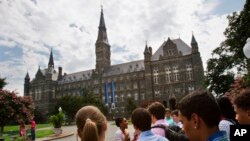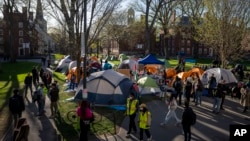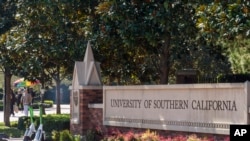Student Union
- By Damare Baker
Georgetown University’s OWN IT Summit Aims to Develop Young Female Leaders

Hundreds of young women chatted in excitement late last month as they waited to hear the experiences and advice of successful female business owners, lawyers and politicians.
Georgetown University hosted its seventh annual OWN IT Summit, a daylong conference that aims to bridge the gap between female leaders and college-age women. The day was filled with female-led panels and breakout sessions that addressed topics ranging from women in STEM (science, technology, engineering and math) to self-defense.
This year’s event began with a panel on changing workplace culture to be more gender-inclusive. Moderated by Georgetown University Law Center professor Dr. Jamillah Williams, panelists Maya Raghu, Jessica Grounds and Patricia Porter shared their thoughts on the current state of workplace cultures.
The panel encouraged young women to “see if there is concern within the company to make room for innovation” and to “listen to their gut” when applying for jobs.
“It may not feel like that at certain points in your life, or early on in your career,” said Raghu, the director of workplace equality and senior counsel at the National Women’s Law Center. “But you are and can be a leader and you have the power and the ability to sort of transform your job workplace or community.”
Spreading these messages to young women has been the mission of the OWN IT Summit since its founding in 2014. OWN IT was started by Georgetown students Helen Brosnan and Kendall Ciesemier to address the leadership gap and provide young women with an opportunity to connect with female leaders.
“We believe that by creating this space our speakers can give real advice on how to navigate the complicated road to leadership as a woman to the next generation of leaders,” Emma Turner, the executive director of OWN IT, said.
However, OWN IT isn’t just having a big impact on Georgetown students. The summit is now being held at eight other schools and has cultivated a diverse network of female students and leaders.
“It's so important for women to come together to talk about the challenges we still have, what we need to do to get to the next level,” said Grounds, the co-founder of Mine the Gap, an organization that trains industries and organizations to create and sustain gender-inclusive environments.
Georgetown sophomore Aida Ross, who attended and volunteered for the event, said OWN IT is “a great opportunity for young women to meet amazing people.” While attending the event last year, she met a panelist who later became her mentor.
“I think [OWN IT] really stood out to me because it shows how much of an impact that conferences like this have on young girls,” Ross said. “It creates a dialogue surrounding women's participation and highlights role models for strong female leadership.”
To its leadership team, the OWN IT Summit is thought to have a strong connection to International Women’s Day, which is Sunday. International Women’s Day celebrates the social, economic, cultural and political achievements of women and calls for increasing gender parity around the world.
“Women face challenges, but women have conquered them,” Turner said. “OWN IT celebrates the potential and great impact that women already have in our world."
See all News Updates of the Day
US remains top choice for Indian students going abroad

About 69% of Indian students traveling abroad for their studies chose the United States, according to a Oxford International’s Student Global Mobility Index. Other popular choices were the United Kingdom, Canada and Australia.
Education Times reports the main influencers for deciding where to study abroad – for Indian students and others – were parents. (April 2024)
Malaysian official: Schools can’t turn away from global tensions

Zambry Abdul Kadir, Malaysia’s higher education minister, said protests spreading across universities in the United States show that schools can’t ignore political tensions.
Helen Packer, reporting in Times Higher Education, said the minister reminded educators that universities are key in the development of leaders, individuals and societies. (April 2024)
Social media breaks are difficult, but necessary

Between online classes, maintaining social connections and working on projects, college students can have a hard time disengaging from the demands of technology.
In Florida International University’s PantherNOW, Ariana Rodriguez offers strategies for taking a break from social media. (April 2024)
- By Melos Ambaye
Many master's degrees aren't worth the investment, research shows

Nearly half of master's degrees have a negative financial return, according to new research by the Foundation for Research on Equal Opportunity, an economic research organization.
The study indicates that many graduate degree programs do not increase lifetime earnings enough to be worth it.
While 23% of bachelor’s degree programs yield a negative financial return on investment, 43% of two-year degrees and master’s degrees fail to deliver a return, according to the study by Preston Cooper, a senior fellow at FREOPP.
Cooper assessed the return on investment for 53,000 degree and certificate programs to determine whether a student’s lifetime earnings outweigh program costs and the risk of not completing their degree.
His findings show that a student’s field of study was the overriding indicator of return on investment at the undergraduate and graduate level.
Engineering, computer science and nursing bachelor’s degrees have high financial returns on investment, while programs in education, fine arts, psychology and English usually have low returns.
Graduate degrees in medicine and law tend to have strong payoffs. But a large share of master’s programs, including the MBA, frequently have low payoffs, according to Cooper.
Although workers with master’s degrees earn 16% more than those with only bachelor’s degrees, Cooper says the figure fails to account for students who had “higher preexisting earnings potential.”
“MBA students typically have high preexisting earnings potential, having often chosen high-ROI undergraduate majors such as finance and economics,” Cooper writes. “So the MBA adds little value on top of that.”
The study indicates that high starting salaries are predictors of high returns on investment. Degrees with starting salaries of $57,000 a year or more deliver the best lifetime returns.
But the return on investment of a degree can vary depending on the educational institution.
“Students interested in fields with low average pay can still find some schools that do well transforming those fields of study into high-paying careers,” Cooper writes.
The quality of an institution also matters, said William Tierney, professor emeritus of higher education at the University of Southern California.
“An MBA from Harvard is a likely ticket to a good job,” Tierney told VOA. “An MBA from the University of Phoenix, less so.”
But students pursue graduate programs for more than just financial reasons.
“Some degrees open up careers in fields that students may enjoy, such as in the performing arts,” Robert Kelchen, head of educational leadership at the University of Tennessee, Knoxville, told VOA.
“Others can help gain access to social networks or simply help students learn about a topic that is of interest,” Kelchen added.
Cooper told VOA that it might make sense for students in degree programs with low returns on investment to switch majors if they can still graduate on time.
He found the worst outcome for a student’s return on investment is dropping out of college “because they must pay for one or more years’ tuition and spend time out of the labor force.”
Lawmakers who fund higher education have a responsibility in ensuring “higher education delivers on its promise of economic mobility,” Cooper said.
Nearly a third of federal funding, including Pell grants and student loans, pays for higher education programs that fail to provide students with a return on investment, according to the study.
Cooper’s view is that “some schools should shut down low-ROI programs and reallocate institutional resources to programs with a better return.”
“There's definitely this narrative out there that higher education is always worth it, and you should always try to get that extra degree because it will increase your earnings,” he told VOA. “That's reinforced by colleges who make lofty promises regarding their graduate degree programs' outcomes, which all too often fall short.”
Harvard students end protest as school agrees to discuss Gaza conflict

Protesters against the war between Israel and Hamas were voluntarily taking down their tents in Harvard Yard on Tuesday after university officials agreed to discuss their questions about the endowment, bringing a peaceful end to the kinds of demonstrations that were broken up by police on other campuses.
The student protest group Harvard Out of Occupied Palestine said in a statement that the encampment "outlasted its utility with respect to our demands." Meanwhile, Harvard University interim President Alan Garber agreed to pursue a meeting between protesters and university officials regarding the students' questions.
Students at many college campuses this spring set up similar encampments, calling for their schools to cut ties with Israel and businesses that support it.
The Israel-Hamas war began when Hamas and other militants stormed into southern Israel on October 7, killing some 1,200 people and taking 250 hostages. Palestinian militants still hold about 100 captives, and Israel's military has killed more than 35,000 people in Gaza, according to Gaza's Health Ministry, which doesn't distinguish between civilians and combatants.
Harvard said its president and the dean of the Faculty of Arts and Sciences, Hopi Hoekstra, will meet with the protesters to discuss the conflict in the Middle East.
The protesters said they worked out an agreement to meet with university officials, including the Harvard Management Company, which oversees the world's largest academic endowment, valued at about $50 billion.
The protesters' statement said the students will set an agenda that includes discussions on disclosure, divestment, reinvestment and the creation of a Center for Palestine Studies. The students also said that Harvard has offered to retract suspensions of more than 20 students and student workers and back down on disciplinary measures faced by 60 more.
"Since its establishment three weeks ago, the encampment has both broadened and deepened Palestine solidarity organizing on campus," a spokesperson for the protesters said. "It has moved the needle on disclosure and divestment at Harvard."









